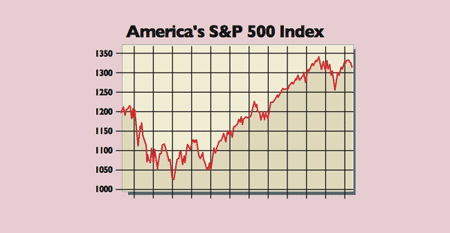
“It’s often said that bull markets climb a wall of worry,” says Neil Hume in the FT. There’s certainly “been plenty to fret about”. Despite unrest in the Middle East fuelling a higher oil price, the disaster in Japan and another bail-out in Europe, major developed-world stockmarkets have risen sharply since mid-March.
But the wall of worry is getting higher. For starters, the boost from surprisingly strong profit growth is set to slow. Telis Demos of the FT notes that S&P 500 earnings per share expanded by 41% in 2010, but a figure of 13% year-on-year is being pencilled in for this quarter. Strong margins have been a key reason for positive US earnings surprises in recent quarters – but in most sectors they are now above the 2007 peak, says Lex in the FT. They look “unsustainably high”, given that “post-crisis cost-cutting… is probably over now” and commodity prices are climbing rapidly. The consensus expects margins to widen further this year, which looks “mightily optimistic”.
The wider problem is that global growth momentum is slowing. American fiscal policy is now tightening; austerity is kicking in across Europe, Japan has been weakened by the quake and China is cooling. The US Fed is due to end its money printing in June, and interest rates all over the developed world have nowhere to go but up.
All that also ignores the stagflationary impact of the rise in the oil price. Oil has already got close to $130 a barrel and is posing a major threat to consumption. At $150 it would add 3% to global inflation and wipe 0.75% off growth, reckons Luca Ricci of Barclays Capital. Meanwhile, it’s too soon to be sure that Spain will get on top of its debt load, even if its bond yields have “broken away from the periphery pack”, says Fiona Maharg-Bravo on Breakingviews. In addition, fears over nuclear contamination in Japan could flare up again.
On the plus side, there is still plenty of liquidity buoying global markets and, as Morgan Stanley points out, stocks are “the least bad house in the neighbourhood”: sticky inflation means they’re more appealing than cash and bonds. All in all, reckons Morgan Stanley, stocks may be in for a few months of stagnation as headwinds mount. The good news is that the best bets for uncertain times, high-yielding defensive stocks, are looking cheap.